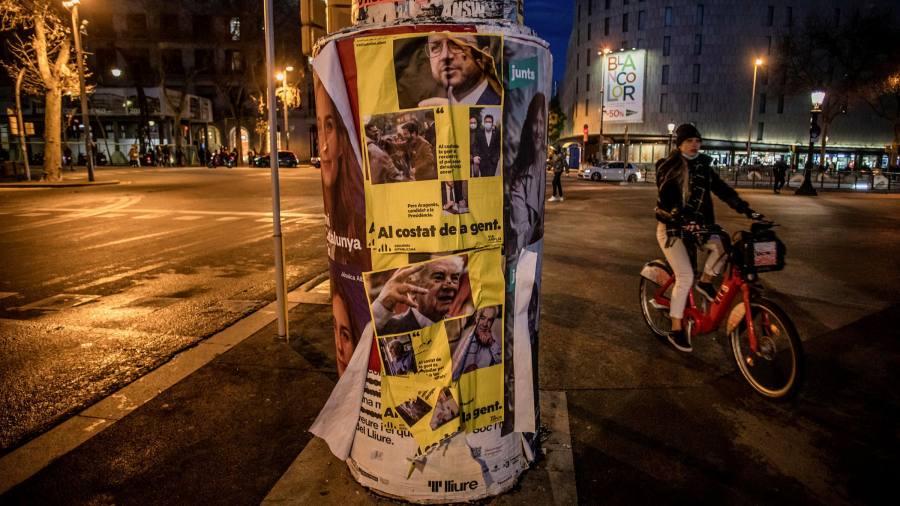[ad_1]
Just days before a vote that could shape the future of the campaign for Catalan independence, the region’s separatists are looking north for inspiration, taking a leaf from the Scottish National party’s playbook.
Pere Aragonès, caretaker head of the Catalan administration, hopes an approach that owes much to the SNP will help the separatists prevail in Sunday’s regional elections — and put Catalonia on the path to independence.
“If there is a model we can focus on, it is the Scottish one: an effective, progressive government and a referendum recognised by the UK that was the result of negotiations,†he said in an interview with the Financial Times.
But big questions remain on whether the paths of Catalonia and Scotland have diverged after a fateful decade for both, with the campaign for Catalan independence in the balance even as the push for Scotland to leave the UK appears to be gathering pace.
Three years after an unconstitutional referendum and declaration of independence that led to jail terms for top regional politicians, Catalan separatists are seeking to revive their cause in Sunday’s vote, while pro-Spain parties, notably the Socialists, want to shelve the whole issue.Â
Aragonès said if the separatists gained more than 50 per cent of the vote — a threshold they have not yet passed — his Catalan Republican Left party (ERC) would seek agreement with Madrid on holding an independence referendum. However, the national government has ruled out any such vote and the country’s constitution states that Spain is “indivisibleâ€.
The other big separatist grouping, Together for Catalonia, whose candidate Laura Borrà s is a former academic, advocates a more confrontational approach to Madrid.Â
In a measure of the significance of the vote, Pedro Sánchez, Spain’s prime minister, has spent several days campaigning in Catalonia and his Socialists have tapped Salvador Illa — the country’s health minister until last month — to lead their campaign. Illa maintains a small lead in polls but with no guarantee he can prevent the combined pro-independence parties from retaining a majority in the regional parliament.
The big issue is whether Scotland and Catalonia are headed in different directions since Scotland’s 55-45 per cent No vote in a 2014 independence referendum and Catalonia’s own, unconstitutional 2017 referendum — which was followed by a period of direct rule by Madrid.
The SNP appears on course for another big victory in this May’s Scottish parliament elections, with Brexit, the unpopularity of UK prime minister Boris Johnson and the pandemic fuelling pro-independence sentiment.Â
By contrast, the Catalan independence movement has taken few big initiatives since its own referendum, which had a participation rate of 43 per cent. The Catalan leader at the time, Carles Puigdemont, fled to Belgium rather than face trial, while his deputy, Oriol Junqueras, leader of the ERC, remains in jail.Â
“I think the current situation and the provisions of the Spanish constitution will prevent the Catalans from doing what the independentistas want, whereas there is a risk we will sleepwalk into a dissolved UK,†said John Elliott, a former Regius Professor of History at Oxford, who wrote 2018’s Scots and Catalans. “There’s a much greater fear of fragmentation in Spain.â€
Some social scientists describe the Catalans as more divided than the Scots, arguing the region’s history of migration from southern Spain or Latin America brought in generations of Spanish rather than Catalan speakers who are indifferent or hostile to separatism. There has been no equivalent in Catalonia to polls that consistently put support for Scottish independence at more than 50 per cent.Â
“In Catalonia we have a very divided population, part of which feels itself to be very Spanish,†said Berta Barbet, a research fellow at the University of Barcelona. “And there’s another issue: for a nationalist Spaniard, Catalonia is Spain, while for many English nationalists, Scotland isn’t part of their identity.â€
Aragonès represented the strand of separatism that wants to focus on dialogue with Madrid, rather than continued confrontation, she said.
Aragonès himself plays down divisions among the separatists. “At the end of the day, the independence movement thinks the same thing,†he said. “Our adversary is Illa [and the Socialists].†He called for a post-election coalition between separatists and the radical left to maximise the forces backing a referendum: “Dialogue and negotiation are the tools that the independence movement has to take advantage of.â€Â
For the SNP, Catalan politics offer a reminder not just of the importance of unity among independence supporters but also of the perils of going outside the established constitutional order. The failure of the 2017 Catalonia declaration of independence to gain international recognition has bolstered the determination of SNP leaders to win UK government approval for a second Scottish independence vote.
Unlike in Spain, the UK constitution has no bar on secession and prime ministers have long accepted Scots should be able to decide their own future. But some SNP supporters are growing frustrated with the leadership’s reluctance to even threaten any unilateral push for independence, particularly since Johnson’s declaration that London should not approve another Scottish referendum until at least the 2050s.
“It is becoming less and less easy to see how a consensual result is going to emerge if the British government continues in its present fashion,†said George Kerevan, a former SNP member of the UK parliament and co-author of a recent book on Catalan independence.
Kerevan, who this month helped found a grassroots independence movement modelled on a Catalan model, said the SNP would have to consider new ways to force London to accept another referendum, such as treating a general election as a plebiscite or withdrawing its MPs from the national UK parliament. “We have to up the ante,†he said.
Success for the SNP in taking Scotland out of the UK could energise the Catalan independence movement. At present, said one business leader, “the soufflé is going down and so is the tension . . . Just about the only thing that could change the script in Catalonia is Scottish independence.â€
[ad_2]
Source link






